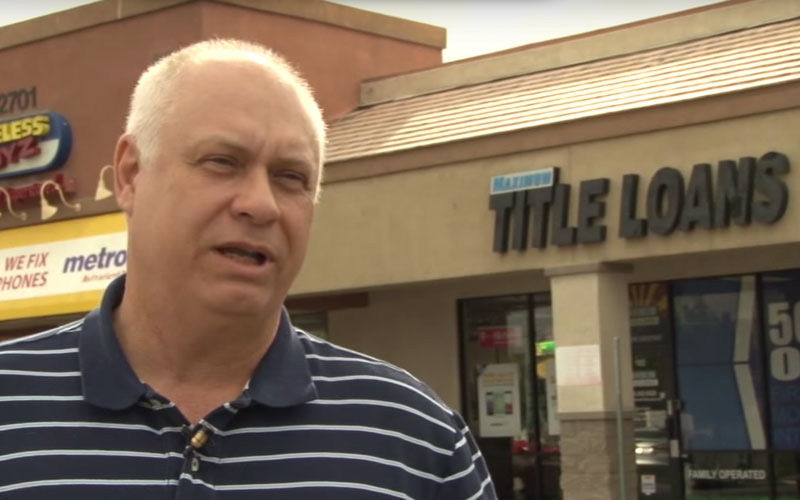PHOENIX — The commercials and online ads for auto title loans make them appear especially enticing during the holiday season, when many families need extra cash.
“I didn’t have a whole lot of money at the time. I wanted to buy some Christmas presents, pay up some bills for my family,” said Scott Sweetalla, a father of two.
The U.S. Air Force veteran shopped around, and thought he found a deal when he called Maximum Title Loans.
“And the gentleman that answered the phone asked me some questions about my vehicle, and then told me, ‘I can get you $2,000 for $150 a month,’ and I thought, ‘Wow, that was great.’”
But he also had to pay an additional $300 a month in interest. When Sweetalla fell behind, Maximum Title Loans called his references.
“In my case, they called them over and over and over again,” he said. “My sister doesn’t even want to talk to me anymore because of it.”
Maximum Title declined a request for an interview, and did not want to comment on the terms of this loan or any other.
Seven months later, when Sweetalla could no longer make the payments, Maximum Title sent someone to his home.
“Woke up the next morning to go to work and my car was gone. My heart kinda sunk. I kinda figured what it might have been,” he said.
As the number of auto title loan companies grows, so does concern that customers don’t understand the risks.
“They keep putting themselves into debt traps because they believe that that’s the only option available to them,” said State Rep. Debbie McCune Davis, D-Phoenix. “I think we actually push those families deeper into debt and further away from opportunity for themselves and their kids.”
After the law that allowed payday lenders to operate in Arizona expired in 2010, auto title loans filled a similar role.
“If you drive through some of the neighborhoods, we know it’s like economic redlining. We know they’re looking at families that make right at or below $40,000 a year,” McCune said.
McCune said she is working with consumer groups to ask the Legislature for stronger regulations to “tighten some of that up.”
“Anything that limits that availability will simply force consumers to either go to offshore lenders, tribal lenders, unlicensed lenders, perhaps somebody in an alleyway,” said Scott Allen, president of the Arizona Title Loan Association. “That is that is not a benefit to consumers certainly in any state, specifically in Arizona.”
Allen describes auto title loans as “fast, efficient and convenient.”
He said critics should talk to consumers who have had a successful experience with a lender and value the service that they provide.
He made Michael Donahoe, a title loan customer, available to talk about his loans.
“It’s always worked out, I have had no complaints about the fees,” Donahoe said.
Donahoe said he worked as a lawyer for 40 years, practicing administrative law for airlines and corporate aviation.
Now retired, he does legal consulting.
He said he has taken out eight title loans in the past 12 years, and he usually pays off the loans in 90 to 120 days.
“The best thing about Cash Time is they’re real quick,” he said. “They make good profit on me. So we both win,” Donahoe said.
Federal regulators are working to ensure consumers understand the terms of their loans.
The Consumer Financial Protection Bureau, a federal agency created in 2010 as part of the Dodd-Frank Wall Street Reform and Consumer Protection Act, is considering a proposal to end “debt traps” that would include guidance to lenders about evaluating whether or not a consumer has the ability to repay the loan.
“There is currently no federal rule that requires lenders to consider whether or not the consumer has the ability to pay in small-dollar loans like payday loans or car title loans.” said Christopher Peterson, special adviser to the director of the consumer bureau.
“We are very concerned about practices in the marketplace that appear to trap consumers in debt,” Peterson said.
The bureau expects to announce a notice of proposed rule-making as early as 2016 followed by a 90-day period of public comment. But there is no timetable for when or if a new regulation will take effect.
In the meantime, the industry continues to grow. But it’s hard to know exactly how many auto title loan companies replaced payday lenders in Arizona.
“We have had an increase in the sales finance licensing,” said Lauren Kingry, superintendent of the Arizona Department of Financial Institutions. “However, it’s difficult for us to determine if they are payday lenders or if they are businesses interested in just a sales finance license.”
The department also takes consumer complaints.
“Many complaints are resolved by way of just discussing what was signed and discussing the details of the transaction without having any further actions being taken on part of the consumer,” Kingry said.
Sweetalla still looks for his car.
“I see a similar vehicle every once in a while on the street, and I’m like, ‘Nope, that’s not mine.’”
He won’t be looking for another auto title loan.
“The money you would get from these people is not worth what’s going to happen later.”





